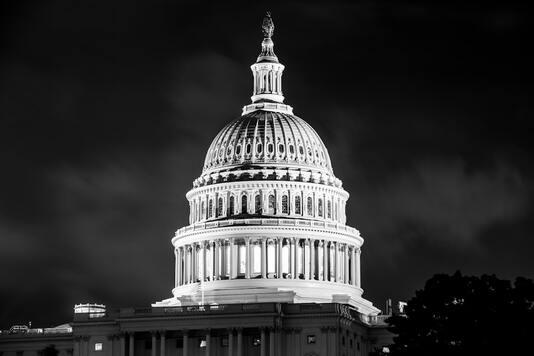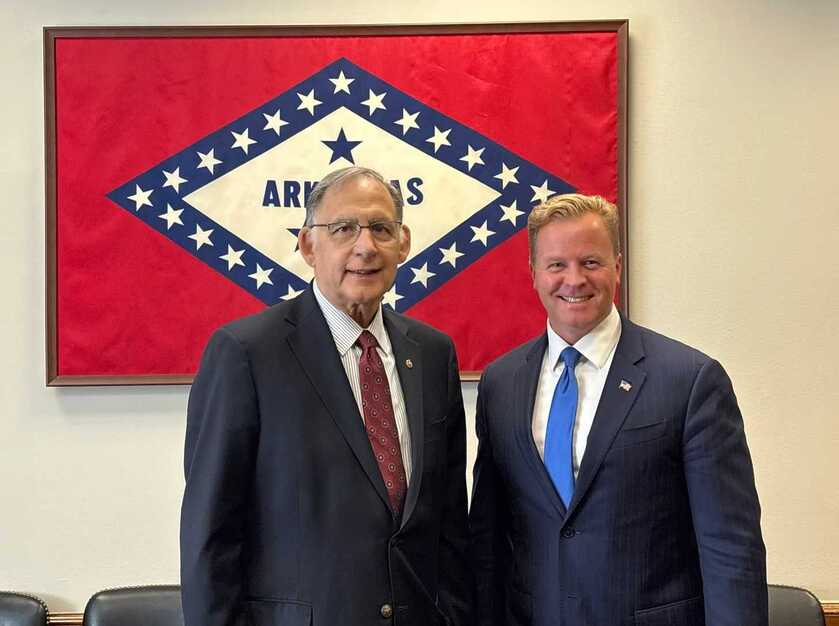Welcome to the Friday edition of the Crypto In America newsletter!
We’re closing out the week with a look at CFTC Chair nominee Brian Quintenz’s meetings with Senators ahead of his upcoming nomination hearing before the Senate Agriculture Committee.
Donald Trump’s nominee to lead the Commodity Futures Trading Commission, Brian Quintenz, has started meeting with members of the Senate Agriculture Committee in a bid to secure their support ahead of the upcoming vote to advance his nomination.
While the Agriculture Committee has not yet officially scheduled Brian Quintenz’s appearance, Crypto In America has learned that efforts are underway to hold the hearing later this month.
In anticipation, Quintenz met with Committee Chairman Senator John Boozman (R-AR) in his office on Thursday where the two discussed the CFTC’s role in risk management, supporting the agriculture industry, and fostering innovation within those areas.
In a meeting with committee member Senator Chuck Grassley (R-IA) earlier in the week, the pair discussed the possibility of the CFTC gaining direct jurisdiction over digital asset spot markets, in addition to its existing authority over futures markets.
The proposal to give the CFTC more authority over regulating crypto has been raised by senior members of the Trump administration, who have expressed interest in seeing the Securities and Exchange Commission take a more focused role in regulating securities while allowing the CFTC to oversee the broader scope of the crypto market, including spot trading.
The move would require approval from Congress, particularly the Senate Agriculture Committee, which oversees the CFTC. The committee would need to authorize additional funding for the agency to take on this expanded role.
Cryptex Advances Efforts to Influence DeFi Policy in Washington

U.S. DeFi platform Cryptex is preparing to expand its presence in Washington D.C. to ensure that decentralized finance protocols are properly represented in the crypto policy discussions taking place in the nation’s capital.
This week, Cryptex launched an on-chain vote, allowing its community to decide whether funds from its DAO (Decentralized Autonomous Organization) should be allocated to support its advocacy efforts in Washington, D.C. The proposal passed with majority support, positioning Cryptex as one of the first U.S.-based DAOs to actively engage in policy advocacy at the federal level.
“The future of decentralized finance in the United States will be decided in Washington,” Cryptex founder Joe Sticco told Crypto In America. “This is not just about Cryptex — it’s about ensuring all decentralized protocols have a voice in Washington. If we don’t engage now, centralized financial institutions and legacy entities will dictate the future of the space.”
The unique nature of DeFi, with no central authority to regulate, will be a key consideration for lawmakers as they work to establish clear rules for the crypto industry. DeFi advocates are hoping that market structure legislation, currently being worked on in the House, will allow for a regulatory framework that accommodates decentralized platforms as well as centralized ones like exchanges.
Weekly Recap

Here are some of the biggest news stories this week from the intersection of Washington and Web3:
Paul Atkins, nominated by President Trump to serve as SEC Chair, has been approved by the Senate Banking Committee, receiving no support from Democratic members. His nomination now advances to the full Senate for a vote, which will be scheduled at the discretion of Senate Majority Leader John Thune.
After a 13-hour markup session, the House Financial Services Committee passed the bipartisan STABLE Act, the House's stablecoin legislation, with a 32-17 vote. Notably, six Democrats supported the bill.
A district judge has granted Coinbase’s request to restart litigation in its FOIA lawsuit against the FDIC after Coinbase filed a motion earlier this week alleging the agency was being uncooperative in complying with its requests for information.
Eliezer Mishory, Kalshi’s Chief Regulatory Officer, has transitioned to lead the Department of Government Efficiency (DOGE) at the Securities and Exchange Commission. Before joining Kalshi in 2021, Mishory was an attorney at both the CFTC and the IRS.
A recent report from Trammell Venture Partners reveals that Bitcoin-related startup deals surged by 50% in 2024, and a whopping 767% since 2021. The growth in 2024 can be traced to Bitcoin's rally, fueled by Wall Street’s involvement in Bitcoin ETFs and positive rhetoric from then-presidential candidate Donald Trump.
Crypto prices took a hit in reaction to Trump’s ‘Liberation Day’ tariffs with Bitcoin falling from around $88,000 to $82,000 following his Wednesday announcement. Crypto stocks like Coinbase and Strategy also fell sharply and are on track to end the week lower.
Circle, the issuer of stablecoin USDC, officially filed with the Securities and Exchange Commission to go public on the New York Stock Exchange. The company will list under the ticker CRCL and is aiming for a market valuation of around $5 billion.
Remember, new editions of the Crypto In America newsletter drop every Monday, Wednesday and Friday at 7AM EST.
If you like what you’re reading, don’t forget to subscribe!

🙏Please Support My Work 🙏
If you find value in my content, consider showing your support:
💳 PayPal – Simply scan the QR code 📲
🔗 Crypto – Support via Coinbase Wallet to: [email protected]
Your generosity keeps this mission alive! Namasté 🙏✨ #SupportIndependentMedia #Crypto












 All while Pfizer—a company with a $2.3 billion criminal fine for fraudulent marketing, bribery, and kickbacks—was given blanket immunity from liability and billions in taxpayer dollars to produce a vaccine in record time with no long-term safety data.
All while Pfizer—a company with a $2.3 billion criminal fine for fraudulent marketing, bribery, and kickbacks—was given blanket immunity from liability and billions in taxpayer dollars to produce a vaccine in record time with no long-term safety data.
























